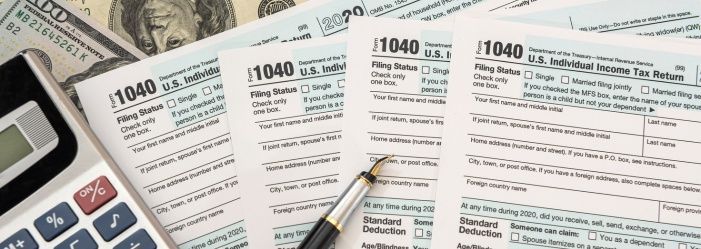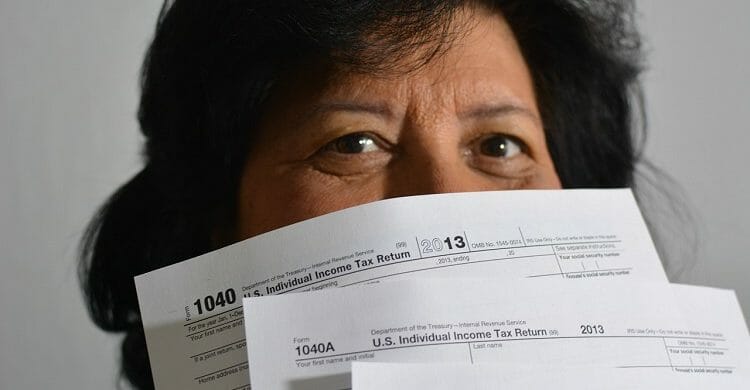Last Updated: March 07, 2025
Prison is a possibility as a penalty for not paying taxes - that's how gangster Al Capone ended up in prison. If criminal charges are filed for tax evasion, tax fraud, or failing to submit a tax filing, you may end up with one year of time served for one year of taxes missed.
The taxpayer may end up with other consequences that will cause you difficulties. These include liens, asset seizure, garnishment and other actions to get the back taxes. You may also lose your passport and ability to travel abroad. Unlike credit card debt where various debt solutions are available, tax debt requires immediate attention to avoid serious consequences.
Tax Evasion Cases
The most common tax crimes involve the attempt to evade taxes. Tax evasion is non-payment or underpayment of tax liabilities. To file criminal charges, the Internal Revenue Service (IRS) must show that the tax evasion was willful and done to avoid paying taxes.
According to the IRS, tax evasion penalties include jail time of no more than five years, a fine of no more than $250,000 for individuals and the costs of prosecution.
You may be sent to county jail or a federal prison if convicted of tax evasion.
Tax Fraud
Tax fraud is willfully and intentionally falsifying information on individual tax returns. To commit tax fraud could include false deductions, filing a fraudulent tax return, claiming incorrect personal expenses, using a fake social security number or not reporting income.
Criminal penalties for tax fraud include:
- Civil tax fraud penalty up to 75% of the tax due, plus back taxes, other penalties like the failure-to-file or failure-to-pay penalties, and interest. These often are assessed through a payment plan.
- Fraudulent failure-to-file results in a penalty of 15% of the unpaid tax each month
- Willful failure to collect or submit trust fund taxes to the IRS can result in Trust Fund Recovery Penalty (TFRP) is equal to 100% of unpaid trust fund taxes
Failing to File Tax Returns

Failure to file a tax return generally involves penalties, along with interest charges on both the penalties and the unpaid taxes. The interest rate applied to tax debts can compound quickly, making your financial situation worse over time. The IRS can choose to file a tax return for you.
If you do not have enough money to pay your taxes or you owe money, contact the IRS immediately. The IRS understands that things happen to every taxpayer. They may be able to work with you through penalty abatement.
They may set up a payment plan of regular monthly payments to help you pay taxes.
If you discover a mistake, always file an amended return using tax form 1040x. It is easier to pay your taxes than it is to avoid them.
Tax Avoidance
Tax avoidance uses legal ways to lower how much taxes are due. It is legal and when done properly is not a crime. To properly meet tax avoidance laws, consider having a CPA file your tax return.
Tax Audits
The IRS can order an IRS audit to see if you file taxes properly and pay your taxes in full. IRS audits usually involve the last three tax years, although if the IRS thinks you have fraudulently filed a tax return, they can go back indefinitely.
A Disclaimer
If you owe taxes or are dealing with the IRS, you really need a professional to represent you. Hiring qualified tax attorneys can make a huge difference. We are not experts in tax laws and are not providing advice.
If you are dealing with criminal justice debt, your best recourse may be to contact the ACLU.
If you are dealing with civil court and debt collectors, you may want to contact an attorney or find a low-income legal adviser. If you live near a law school, students are often available to help with advice.
Filing Taxes
If you are having trouble filing your taxes, look for an IRS sponsored VITA program. These volunteers can help you file taxes. For help filing your tax return, you must meet some basic qualifications, but most people do qualify. Click here for more information.
You can also look for tax software that will help you file.
A tax liability can follow you indefinitely. You cannot ask for your tax debt to be discharged in bankruptcy. The IRS can garnish your wages or freeze bank accounts without taking you to court, although you do receive a letter of intention.
Prevent Future Tax Issues
While resolving current tax debts is the priority, you also want to take steps to prevent issues from piling up again in the future. Here are some tips:
- Review your tax withholding - Work with accounting to adjust W-4 allowances if too little is being withheld from paychecks
- Make estimated quarterly payments - Self-employed taxpayers should remit estimated payments every 3 months
- Set calendar reminders for deadlines - Mark filing and payment deadlines on your calendar with reminders
- Automate payments when possible - Set up auto-pay through IRS Direct Pay or electronic transfers
- Keep an emergency fund - Having liquid savings helps cover unexpected tax bills when they come up
Hire a Tax Professional
Navigating tax problems on your own can be challenging, but the expertise of tax attorneys and accountants can help guide you through the process. Consider hiring professional assistance with:
- Communicating with the IRS on your behalf
- Calculating payment plans you can afford
- Determining eligibility for tax relief programs
- Optimizing future tax planning and strategy
Reputable tax pros like the team at Pacific Debt Relief know all the ins and outs of IRS rules and regulations. Their expertise can save you time, money, and frustration working through tax issues.
Explore Credit Counseling
In some situations, tax troubles may indicate broader financial difficulties to address. If you are struggling with high-interest credit card balances, medical bills, or other unsecured debt on top of owing back taxes, talk to both a tax pro and nonprofit credit counseling agency for total debt relief. A credit counselor can help you develop a debt management plan to address your overall financial situation while you handle tax issues separately.
What Are Your Options If You Can't Pay Taxes?

Finding yourself unable to pay owed taxes can be stressful and frightening. However, ignoring the issues and avoiding the IRS will only make your situation worse over time. Here are some proactive solutions to consider if you cannot afford tax payments:
1. Apply for an IRS Payment Plan
Payment plans allow you to pay off tax debts in smaller, more manageable installments over time. Based on factors like your overall tax debt, income level, and previous payment history, you may qualify for a short-term payment plan (paying over 120 days or less) or a long-term installment agreement (paying over several years). This prevents harsh collection actions as long as you stick to the agreed-upon payments and helps you pay down debt faster than if penalties continue to accumulate.
2. Submit an Offer in Compromise
With an Offer in Compromise, you can settle tax debts for less than the full amount owed based on your inability to pay. To qualify, you'll submit detailed financial information to allow the IRS to determine a reasonable reduced settlement amount. Approval is based on several factors and not everyone qualifies. Unlike other debt relief services for consumer debt, the IRS has strict criteria for tax settlement.
3. Request Penalty Relief
If penalties and interest continue to grow, you may be able to get penalties waived if you have a reasonable explanation. Things like medical emergencies or natural disasters can qualify you for First Time Penalty Abatement or other penalty relief programs. Reducing accruing penalties makes paying down the original tax debt easier.
The key is being proactive and communicating with the IRS early about your inability to pay. They have procedures in place to help taxpayers navigate these situations. Contact our experts or speak to an IRS representative to discuss the tax relief options available to you.
FAQs
Conclusion
While jail time is rare for minor tax violations, criminal charges for tax fraud and evasion should not be taken lightly. Consequences can be severe.
The best way to avoid trouble is to address tax debts proactively:
- File on time, even if you can't pay in full right away
- Communicate with the IRS about payment plan options
- Consider tax relief programs you may qualify for
- Consult a tax expert for guidance on resolving issues
If you currently owe back taxes or suspect an error on a past return, take action now. The sooner you address tax issues, the easier it is to correct them. Our team can perform a free analysis of your situation and provide expert assistance.
Pacific Debt, Inc
Before you declare bankruptcy, you may want to contact the debt settlement professionals at Pacific Debt, Inc. If you'd like more information on debt settlement or have more than $10,000 in consumer debt or credit card debt that you can't pay,
contact Pacific Debt, Inc. We may be able to help you become debt free in 2 to 4 years. We have settled over $250 million in debt for our customers since 2002.
Pacific Debt, Inc is accredited with the Consumer Debt Relief Initiative (CDRI) and is an A+ member of the Better Business Bureau. We rate very highly in Top Consumer Reviews, Top Ten Reviews, Consumers Advocate, Consumer Affairs, Trust Pilot, and US News and World Report.
For more information, contact one of our debt specialists today. The initial consultation is free, and our debt experts will give you all your options.
*Disclaimer – We are not lawyers or tax professionals and we are not giving legal or tax advice. These are merely some options and information about taxes. Consult an attorney or tax professional in your area to determine all your options.
RELATED POSTS
- Pacific Debt Inc Rated One of the Best Debt Settlement Companies of 2020 (February 13, 2020)
- How To Build Your Credit After Debt Settlement (October 11, 2019)
- New Study Finds Debt Settlement Helps the Economy (September 24, 2019)
- How to Get Out of Debt Yourself (June 5, 2019)
- Letter for Debt Settlement Agreement (May 6, 2019)
What Are The Tax Consequences of Debt Settlement?Letter for Debt Settlement Agreement
Reduce Your Credit Card Debt By Up to Half

BBB Reviews | 4.9/5.0 Rating









 Do Not Sell My Personal Information
Do Not Sell My Personal Information